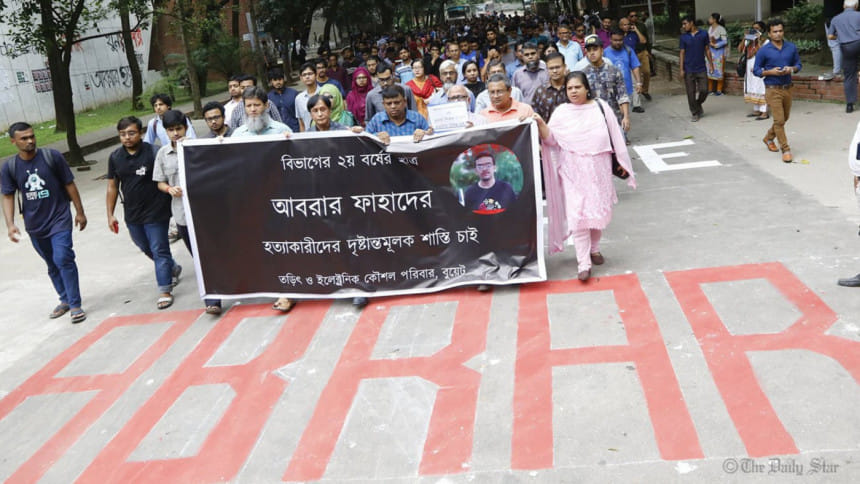Is banning student politics the solution?

"Ban student politics" has become the rallying cry for the past few days, in both the social and mass media. The chorus is not new; we have heard this too many times. Each time there has been a violent incident on a campus, or a promising life is lost in some fight among or between student activists of political persuasions, the issue comes to the fore. Notwithstanding the shock and grief due to the unfortunate incidents, and the sincerity in the emotional plea to save young lives, the argument to ban student politics as a panacea is misplaced and signals a worrying development. The arguments for the proscription sound like an argument for getting rid of journalism altogether to address the problem of "fake news".
The background to the current reincarnation of the discussion is well known to the readers. The brutal murder of Abrar Fahad, a student of the BUET, by student activists of the pro-government Bangladesh Chhatra League (BCL) on Sunday night, has prompted the debate. In this instance, we must be cognisant of the fact that Abrar was not killed in a clash between two student organisations, neither did he do anything that involves student politics. The undisputed fact is that he was killed by BCL activists without any provocation. He was asked to see the BCL leaders of the BUET, escorted to a room of the same dorm where he was living, for "interrogation" for his Facebook post criticising the recently concluded treaties and MOUs between India and Bangladesh during the India visit of Prime Minister Sheikh Hasina. Abrar was killed while being tortured, and his body was left in the landing of the stairs where he was found in the wee hours of Monday.
Painfully, the incident is not an aberration. There have been many incidents of killing and maiming of student activists throughout the history of the nation. Innocent students with no involvement in politics have been killed too. A report by this newspaper counted at least 151 incidents of killings since independence, and almost none was solved. Save one exception, no perpetrators have been held accountable. The nature of these killings has taken a gruesome turn in the past decade since the current Awami League government came into power and its student wing has enjoyed carte blanche impunity. For example, the room where the victim was tortured is infamously known as "the torture cell" of the BCL. Such so-called "torture cells" are allegedly existing in many dorms of almost all public universities. Lest we forget, the public university campuses have been under the complete control of the pro-government student wing since 2009 and all other student activists have been driven out, sadly with the knowledge and support of university authorities. Additionally, the BCL activists—rank and file—have become engaged in extortion, tender manipulation, and mugging within and outside campuses throughout the entire country. The attacks on their rivals have become too normal to be reported in press. At times intra-organisation warlike battles on the streets have killed bystanders and didn't spare unborn children. According to Prothom Alo's count, between 2009 and 2014, at least 54 people were killed by the BCL, 39 of them their own.
Understandably, the grim picture was in the mind of everybody as they heard the news of the killing of Abrar—another family has lost their loved one, another father had to carry his own child's dead body to the grave, and another grieving mother asked, why did my son die? Those who favour proscription point to these incidents and argue for immediate action. They make three arguments—too many promising lives lost; activists of student politics have become the foot soldiers of the political parties and fodder of partisan clashes; and the relevance of student politics has been lost in contemporary Bangladesh.
Of course, too many have died, one too many. But it is imperative to ask why nobody has been brought to justice? The failures of the law enforcement agencies in apprehending these perpetrators cannot be masked by shifting the blame to the students who have been on the receiving end and who want to exercise their fundamental rights of assembly and organisation enshrined in the constitution. The politicisation of law enforcement and impunity of pro-government activists, irrespective of who is in power, are to be blamed. We must ask, has the judiciary failed too? The killing of Biswajit in broad daylight and the verdict seem to be inconsistent to many. The case of Abu Bakar, an innocent student who was killed during the BCL intra-party fight in 2010 at Dhaka University, is a telling example. While ten BCL activists were charged for the murder, eight years later they were acquitted. The most apt headline of a newspaper was—"Nobody Murdered Abu Bakar!"
The impunity goes far beyond the campuses; there are several high-profile cases which have remained unsolved. The killings, whether within the campus or outside, in the name of the ruling party have received a different treatment. University authorities, in equal measures, should be held responsible for being derelict in their duties. In each instance of a death, the University authority appointed an enquiry committee, most of which never produced a report. While the ruling party activists are terrorising the campuses, and everyone else is shirking their responsibilities, why should the feeble voices of opposition activists, contrarian voices within the student community be targeted and silenced? Why should they bear the burden? The unbridled control of the ruling party activists on campuses has been established with the connivance of the university teachers, many of whom are keener on becoming a tool of a political party, especially the ruling party, than becoming a teacher. Becoming an administrator at the expense of basic integrity and commitment to the students' welfare is very common. Will the teachers be barred from partisan affiliation and behaviour?
Student politics has undergone a dramatic change since 1990, for worse. Thanks to the political parties, especially the ruling parties, for turning the student activists into pawns for the party's gains. They have been used to capture the campuses and thrash the opposition student activists and unleashed against non-partisan student and youth movements. It is too early to forget the behaviour of the BCL activists against the quota reform movement and road safety movement in 2018. Without exonerating the individuals for their criminal act, we must acknowledge that the responsibility lies with the political parties. Yet the suggestion of interdiction of student politics accompanies no punitive measures for the political parties.
Discussions on the relevance of student politics tend to take an emotional journey back to history. The importance of the role of the students in the making of Bangladesh notwithstanding, I argue it is far more relevant today than ever before. With the shrinking of democratic space in politics, absence of tolerance in society, almost non-existence of accountability in governance, and abuse of power all around, and at a time disagreement with the government is labelled as unpatriotic, it is imperative that students have the opportunity to stand up and shape the future they will have to live in. This is where my concerns about the proposition come.
In the past years Bangladeshis have lost a fundamental tool of democracy—the right to vote; election as an institution has been ruined by design. As I wrote a few months ago, politics has gone missing: "politics, above all, is about the citizens' right to speak freely, without fear. The freedom of expression, enshrined in the Constitution of the country, has now become elusive" (The Daily Star, February 25, 2019). This is what depoliticisation of a society looks like; peeling off one institution at a time, taking away the fundamental rights of one segment of society at a time.
Ali Riaz is a distinguished professor of political science at Illinois State University, USA. His recent publication is titled, Voting in A Hybrid Regime: Explaining the 2018 Bangladeshi Election (2019)

 For all latest news, follow The Daily Star's Google News channel.
For all latest news, follow The Daily Star's Google News channel. 



Comments